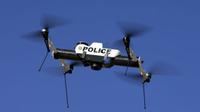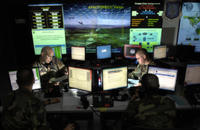-
The DARPA Robotics Challenge begins

The DARPA Robotics Challenge (DRC) began yesterday, and DARPA wants to know whether you will be part of it; DARPA introduces teams for Tracks A and B, opens registration for Tracks C and D, and launches simulation software for download; the goal of the competition is to help advance robotic technology to the point where it can have a tangible impact on humanitarian assistance and disaster relief
-
-
Looming sequestration causes Navy to looking at future technology, fleet size

Adm. Mark Ferguson, vice chief of naval operations, offered a revealing look at the potential future for the Navy if sequestration, or automatic defense cuts, goes into effect in January; without some sort of adjustment by Congress, currently the subject of discussion on Capitol Hill, the nearly 10 percent across-the-board Department of Defense budget cuts are slated to commence in 2013 and continue for ten years
-
-
New high security police barracks opens in Maryland

The new $11.3 million Maryland State Police Barracks has opened up in Hagerstown, Maryland; the facility features many security measures and can serve as a command center in the event of a major emergency
-
-
As domestic use of drones grows, privacy advocates worry

Small aerial drones are moving from the battlefield to local communities, and the pace grows faster; during the next year, drones may be used in cities and towns to help fight crime and keep officers out of danger; their use would save on the cost of fuel for police helicopters; some would feel safer as a result, but activists worry that this could be the beginning of a systemic invasion of privacy
-
-
Faster data analysis on tactical handheld devices
The Office of Naval Research (ONR) announced a new program to optimize tactical handheld technology for quick decision-making in the field; the Exchange of Actionable Information at the Tactical Edge (EAITE) program, designed to sift through data from multiple sources for faster analysis
-
-
Syracuse University, city police to join forces to make area safer
The Syracuse Police Department (SPD) has agreed to join forces with Syracuse University’s Department of Public Safety (DPS) to increase the police presence on university ground and the surrounding communities
-
-
Experts, engineers gather to contribute to DARPA’s Plan X

DARPA’s Plan X will attempt to create revolutionary technologies for understanding, planning, and managing DoD cyber missions in real-time, large-scale, and dynamic network environments; Proposers’ Day dialogue cements program approach
-
-
Twenty-year anniversary of U.S. last full-scale nuclear test
The first U.S. nuclear test, code named Trinity, took place in southern New Mexico forty-seven years earlier, on 16 July 1945; in all, the United States conducted 1,030 nuclear tests – the last one, code-named Divider, took place twenty years ago, on 23 September 1992
-
-
Hezbollah drone represents changing technological landscape for Israel
Israel’s air defenses worked just fine in handling the drone launched by Hezbollah last week: the drone was picked up by Israeli surveillance as it was launched from southern Lebanon, then tracked as it flew south over the Mediterranean; it was allowed to enter Israeli air space so that after it was shot down, its remains could be collected and analyzed; still, the incident made many Israelis sit up and take notice; Israel, a country which has pioneered the use of UAVs as an integral part of military operations and which has held a monopoly on operating drones in the region, was forced to realize that is adversaries, too, now had access to the technology
-
-
Worries about UAV use in both military and domestic missions exaggerated

Dr. Steven P. Bucci, a Senior Fellow for Homeland Security & Defense Issues at the Heritage Foundation, talked with Derek Major, the Homeland Security News Wire’s executive editor, about the growing use of UAVs in both military and domestic law-enforcement missions; Bucci says that in targeting militants, American drone operators exercise a great deal of care to minimize, and eliminate if possible, death and injury to innocent civilians; he also says that the use of drones in domestic law-enforcement missions, if done properly, will not pose Big Brother risks, because drones may make surveillance easier and cheaper, but it will not give law-enforcement agencies any new authorities
-
-
Elected judges take tougher stance prior to elections
The last few months leading up to an election can be a critical, political game changer. One right or one wrong move can quickly change a candidate’s standing at the polls; new research suggests that judges who are elected, rather than appointed, respond to this political pressure by handing down more severe criminal sentences — as much as 10 percent longer — in the last three months before an election compared with the beginning of their terms
-
-
Engaging kids in science for as little as ten hours a year improves math, language scores

Researchers haves found that engaging elementary school students in science for as little as ten hours a year can lead to improved test scores in math and language arts; the students’ average percentile rank in math on a standardized test increased from 53.2 in the third grade to 63.4 in the fourth grade. The language arts percentile improved even more dramatically, rising from 42.8 in the third grade to 60.3
-
-
New military apparel repels chemical, biological agents
Scientists are developing a new military uniform material that repels chemical and biological agents using a novel carbon nanotube fabric; the material will be designed to undergo a rapid transition from a breathable state to a protective state; the highly breathable membranes would have pores made of a few-nanometer-wide vertically aligned carbon nanotubes that are surface modified with a chemical warfare agent-responsive functional layer
-
-
Evidence suggests that three-strikes law does not deter crime
Contrary to what police, politicians, and the public believe about the effectiveness of California’s three-strikes law, researchers have found that the get-tough-on-criminals policy voters approved in 1994 has done nothing to reduce the crime rate; a criminologist finds that decline in alcohol consumption is most responsible for decreasing crime rate
-
-
Different technologies aim to replace dogs as explosives detectors
Bomb-sniffing dogs are the best and most popular way for airport security quickly to detect anyone planning to bring explosives to an airport; scientists are trying to change that; Dr. Denis Spitzer and his colleagues, for example, are working on a sensor that will detect vapors of TNT and other explosives in very faint amounts; the device they are trying to create would replace dogs as the top bomb detecting method in the field
-
More headlines
The long view
Tantalizing Method to Study Cyberdeterrence
Tantalus is unlike most war games because it is experimental instead of experiential — the immersive game differs by overlapping scientific rigor and quantitative assessment methods with the experimental sciences, and experimental war gaming provides insightful data for real-world cyberattacks.
Using Drone Swarms to Fight Forest Fires
Forest fires are becoming increasingly catastrophic across the world, accelerated by climate change. Researchers are using multiple swarms of drones to tackle natural disasters like forest fires.
Testing Cutting-Edge Counter-Drone Technology
Drones have many positive applications, bad actors can use them for nefarious purposes. Two recent field demonstrations brought government, academia, and industry together to evaluate innovative counter-unmanned aircraft systems.
European Arms Imports Nearly Double, U.S. and French Exports Rise, and Russian Exports Fall Sharply
States in Europe almost doubled their imports of major arms (+94 per cent) between 2014–18 and 2019–23. The United States increased its arms exports by 17 per cent between 2014–18 and 2019–23, while Russia’s arms exports halved. Russia was for the first time the third largest arms exporter, falling just behind France.
How Climate Change Will Affect Conflict and U.S. Military Operations
“People talk about climate change as a threat multiplier,” said Karen Sudkamp, an associate director of the Infrastructure, Immigration, and Security Operations Program within the RAND Homeland Security Research Division. “But at what point do we need to start talking about the threat multiplier actually becoming a significant threat all its own?”
The Tech Apocalypse Panic is Driven by AI Boosters, Military Tacticians, and Movies
From popular films like a War Games or The Terminator to a U.S. State Department-commissioned report on the security risk of weaponized AI, there has been a tremendous amount of hand wringing and nervousness about how so-called artificial intelligence might end up destroying the world. There is one easy way to avoid a lot of this and prevent a self-inflicted doomsday: don’t give computers the capability to launch devastating weapons.
